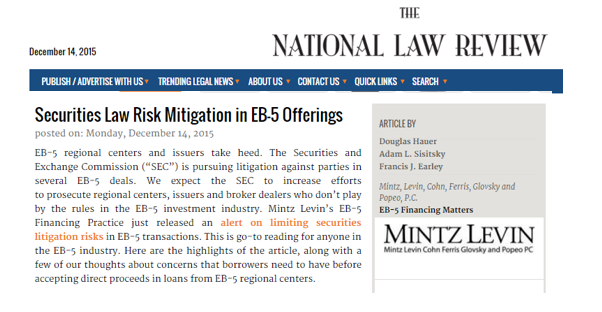
EB-5 regional centers and issuers take heed. The Securities and Exchange Commission (“SEC”) is pursuing litigation against parties in several EB-5 deals. We expect the SEC to increase efforts to prosecute regional centers, issuers and broker dealers who don’t play by the rules in the EB-5 investment industry. Mintz Levin’s EB-5 Financing Practice just released an alert on limiting securities litigation risks in EB-5 transactions. This is go-to reading for anyone in the EB-5 industry. Here are the highlights of the article, along with a few of our thoughts about concerns that borrowers need to have before accepting direct proceeds in loans from EB-5 regional centers.
The “Top Five” EB-5 Violations
What lands regional centers and issuers in hot water with the SEC? Here are the top five recurring themes in EB-5 cases:
-
Diversion and misappropriation of investor funds to projects not disclosed to investors
-
Failure to disclose material facts such as self-dealing in a private placement memorandum
-
False statements about the projected performance of a business, or about the use of EB-5 funds
-
Omission of important facts (e.g., bankruptcy of a developer) from offering documents
-
Siphoning EB-5 funds for personal use
What steps should you take now to mitigate your risk of securities litigation?
We expect law abiding regional centers and issuers to be swept up into the SEC’s broader enforcement net in the coming year. In other words, we think that no matter where you stand in an EB-5 transaction, you should expect to have some level of exposure and therefore should take steps now to secure your deal. Here are a few tips we offer in our article:
First, know the parties selling your deal abroad. Material misstatements in the sales process made by a promoter to an investor can cost you later. Review all marketing materials with securities counsel to ensure that these materials do not contain any misstatements.
Second, know your deal so that your oral statements are always correct when you speak with investors. It is also important to have training and counsel from a securities lawyer on what you may and may not say about your deal before you enter the market.
Third, do not enter the EB-5 marketplace until your deal terms are final. Having multiple versions of a private placement memo circulated makes the offering more difficult to manage—and increases the risk that there will be confusion in the market among investors.
Fourth, an issuer should consult qualified counsel to know whether a specific fact or event is material to disclose to investors in an EB-5 deal. Omissions of material facts can lead the SEC or investors to claim later that you have run afoul of Rule 10b-5.
Finally, get advice on disclosures. Many EB-5 transactions involve related-party transactions and self-dealing. Such transactions necessitate experienced securities counsel precisely to ensure that investors have access to material information.
Strategic Tip: Borrowers in EB-5 Deals Should Also Mitigate Securities Litigation Risks
While issuers and regional centers are the focus of EB-5 litigation right now and into the foreseeable future, if you are taking direct proceeds as a borrower in a transaction facilitated by an EB-5 regional center or issuer you need to have legal advice on the scope of your liability in a deal. Many large-scale EB-5 transactions are driven by a regional center that is facilitating a loan to a project or EB-5 borrower. Borrowers in such transactions often operate under the misconception that they are insulated from liability because they are not an issuer, and that this “insulation” means no accountability to the SEC or to investors.
Nothing could be further from the truth.
The SEC may name an EB-5 borrower in a transaction as a relief defendant in a civil action against a regional center or issuer. An asset freeze, disgorgement and reputational harm, among others, are all possible outcomes if a borrower receives direct proceeds of a toxic EB-5 deal that lands in litigation. The SEC also has the power to sue persons who aid and abet a violation of the securities laws. Borrowers in EB-5 transactions should have protective indemnification agreements in place before receiving EB-5 proceeds; review offering materials to ensure the accuracy of any facts represented to investors about their projects; know the background and experience of the EB-5 regional center before closing a deal; and have separate counsel from the EB-5 regional center controlling the offering process.
- See more at: http://www.natlawreview.com/article/securities-law-risk-mitigation-eb-5-offerings#sthash.bOhegQAz.dpuf
http://www.natlawreview.com/article/securities-law-risk-mitigation-eb-5-offerings
Mentions
Videos





Subscribe for News
Site Digest
Join Professionals on EB5Projects.com →
Securities Disclaimer
This website is for informational purposes only and does not constitute an offer or solicitation to sell shares or securities. Any such offer or solicitation will be made only by means of an investment's confidential Offering Memorandum and in accordance with the terms of all applicable securities and other laws. This website does not constitute or form part of, and should not be construed as, any offer for sale or subscription of, or any invitation to offer to buy or subscribe for, any securities, nor should it or any part of it form the basis of, or be relied on in any connection with, any contract or commitment whatsoever. EB5Projects.com LLC and its affiliates expressly disclaim any and all responsibility for any direct or consequential loss or damage of any kind whatsoever arising directly or indirectly from: (i) reliance on any information contained in the website, (ii) any error, omission or inaccuracy in any such information or (iii) any action resulting therefrom.


